Background
1. Population aging and increase in dementia patients
The global population is aging at an unprecedented rate. Consequently, the number of people suffering from dementia is increasing exponentially. As of 2021, 55 million people worldwide are affected by dementia, with an additional 10 million diagnosed every year.
Diseases like Alzheimer’s come with immense social and economic burdens, significantly reducing the quality of life for patients. In 2019, the costs associated with dementia were estimated at $1.3 trillion. By 2030, this figure is projected to exceed $2.8 trillion.
2. Commercialization of brain wave-based technology for early dementia risk assessment
Compared to other devices, EEG measurement tools are portable, user-friendly, and offer more objective and scientific assessments than survey-based diagnostics. These tools pose no risk of side effects or addiction, unlike drug treatments. EEG devices are effective in diagnosing depression, stress, addiction, and concentration disorders.
Chosun University and the Human Anti-Aging Research Institute embarked on a five-year tracking study of brain aging in local residents from 2013. In 2019, they successfully developed the world’s first brain wave biomarker-based technology for early dementia prediction.
In 2021, OMNI C&S introduced OMNI Senior Care, a device that evaluates brain aging to identify dementia at its early stages. This was a collaborative project with the Human Anti-Aging Standard Research Institute. Additionally, iMedicine Co., Ltd. developed iSyncBrain MCI Classifier, which diagnoses mild cognitive impairment leading to memory disorders using extensive brain wave data.
Overview
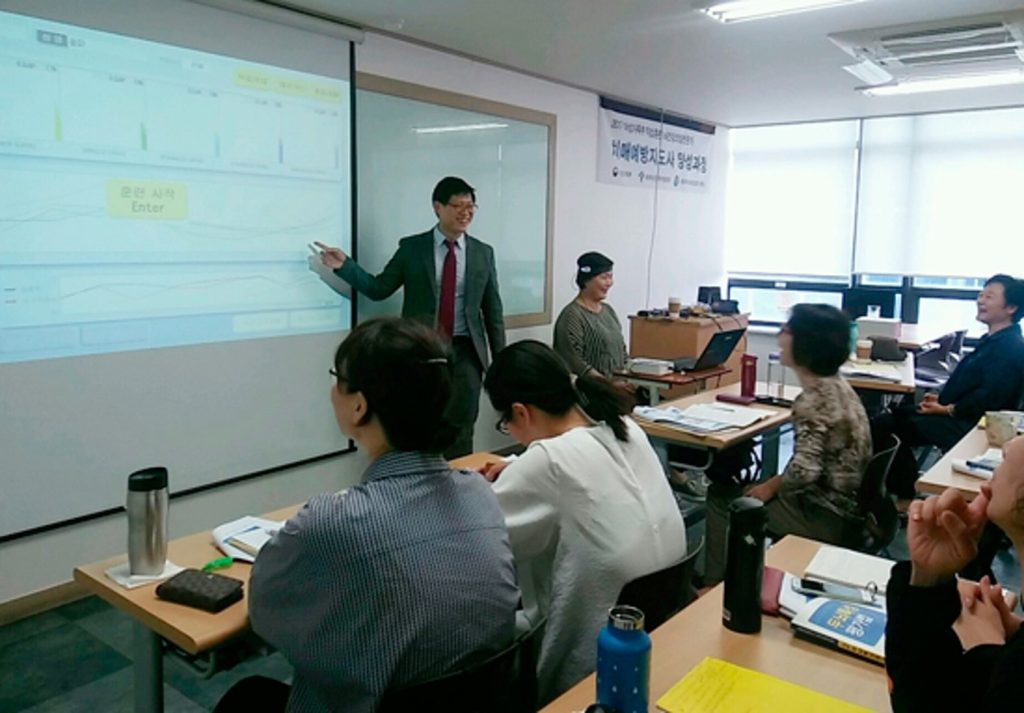
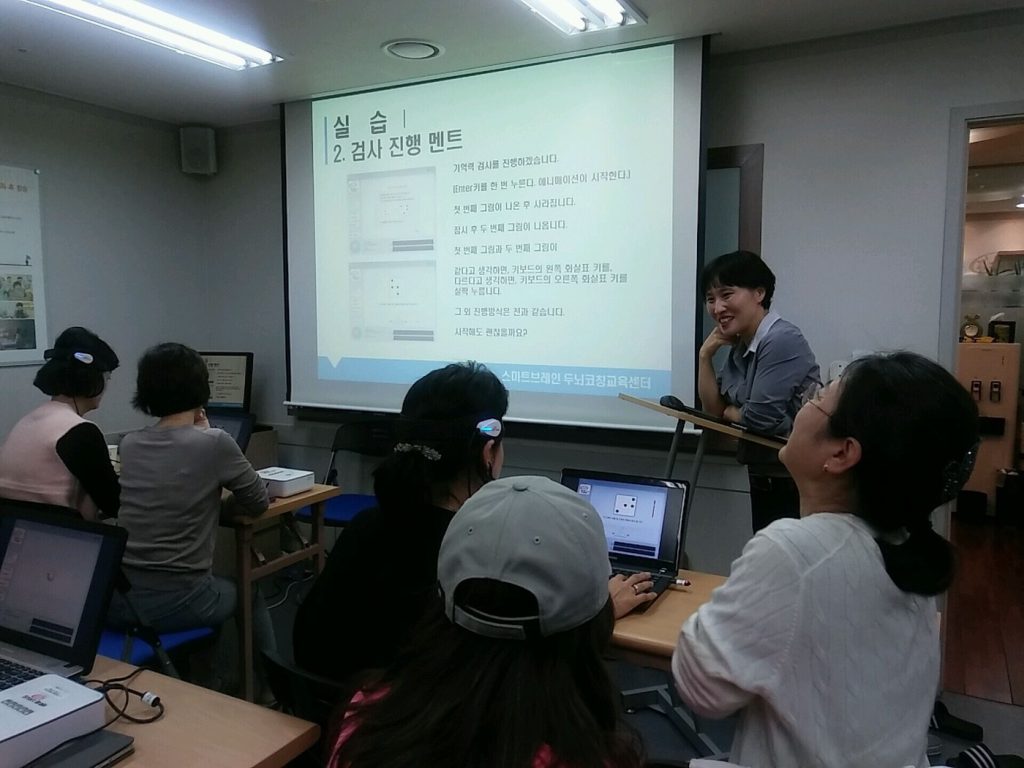
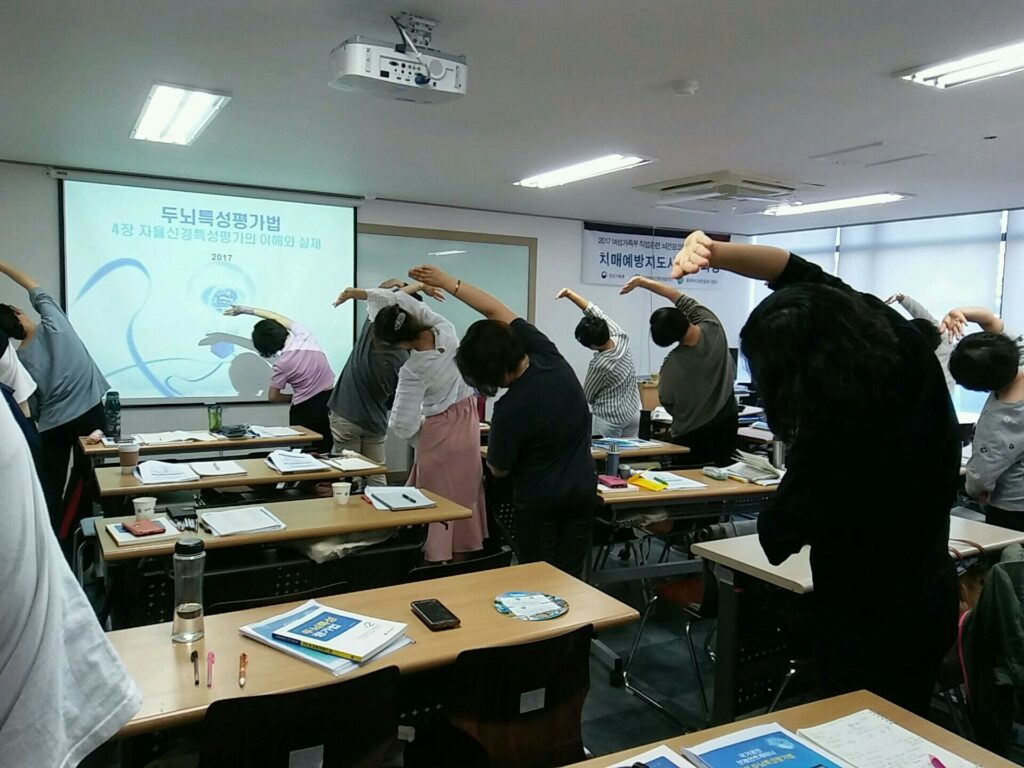
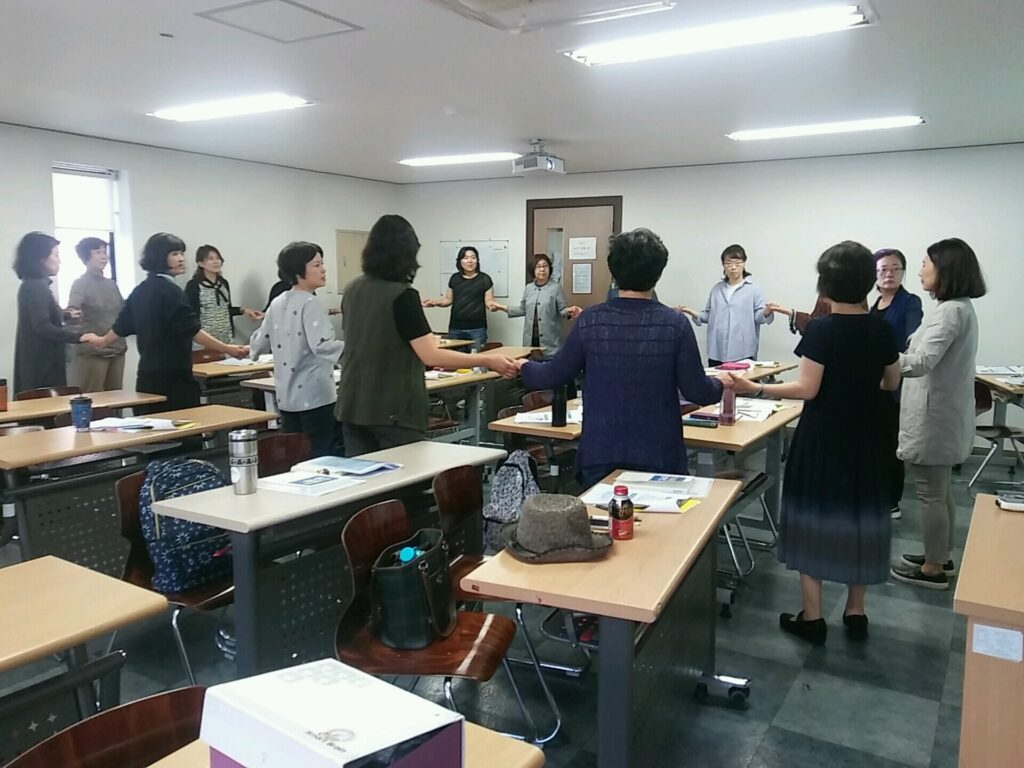
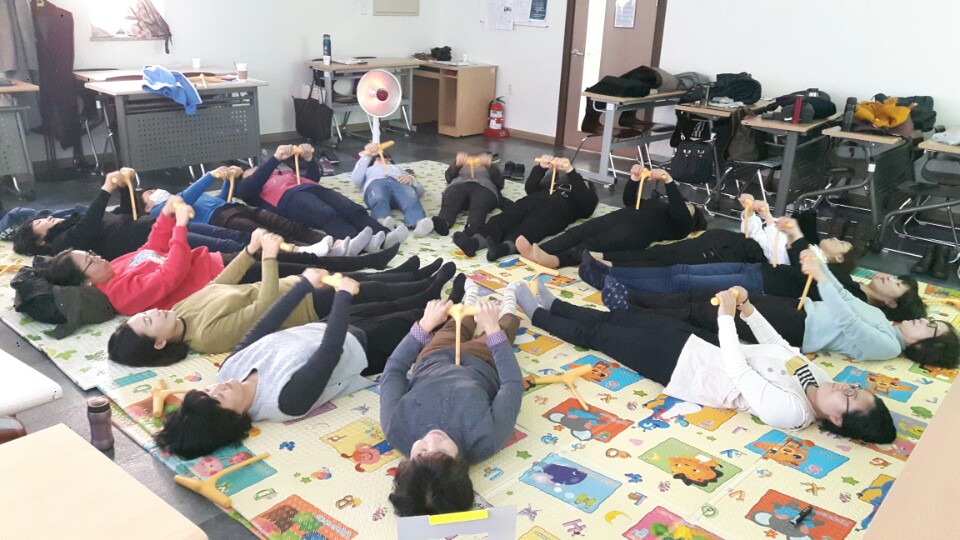
Since 2017, The Brain Trainer Association has conducted an expert course to produce professional brain training instructors focused on dementia prevention. Collaborating with the Women’s Human Resources Development Center and local governments, this course was established to train instructors in conducting physical, emotional, and cognitive activities. These activities are grounded in understanding the brain’s structure, function, aging process, and the mechanisms behind maintaining brain health.
This foundation led to the research, development, and operation of a “brain health recreation instructor” training course. This was selected as a promising future occupation under the women’s future job creation and promotion project by the Seoul municipal government in 2020. The course remains up-to-date, evolving with the times.
| 2017 | – Songpa HRD Center for Women: Dementia Assessment Instructor Training Course |
|---|---|
| 2018 | – Songpa HRD Center for Women: Brain Trainer Course – Jungnang HRD Center for Women: Dementia Assessment Instructor Course – KB Golden Life, Songpa HRD Center for Women: Silver Care Manager Course |
| 2019 | – Songpa HRD Center for Women: Dementia Assessment Brain Trainer Course – Gangdong-gu Office: Brain Education Instructor |
| 2020 | – Promising Occupations for Women (listed ed by Seoul): Brain Health Recreation Instructor Course – Songpa HRD Center for Women Brain Health Recreation Instructor Course – Nowon HRD Center for Women: Brain Health Recreation Instructor Course |
| 2021 | – Brain Health Recreation Instructor Course |
1. Brain wave-based assessment of dementia and brain training: process
- Step 1 Preliminary assessment
EEG measurement to gauge brain function and aging - Step 2 Counseling
Personalized counseling on brain function and aging - Step 3 Training
Brain training for brain health - Step 4 Post-training assessment
EEG measurement to evaluate brain function and aging - Step 5 Coaching
120-Year Life Coaching for brain health
2. Components of the Brain Training Program
- Physical activity
Gentle movements of one’s body strengthen small and large muscles and stimulate the somatosensory senses. - Recreation
Fun activities, such as hand movements, cognitive play, singing, and dancing, stimulate the brain evenly across all areas. - Meditation
Meditation relieves stress by regaining inner composure and clears one’s mind. - Message
Messages of wisdom encourage trainees to have a positive attitude and perception about their past and remaining lives. - Coaching for healthy aging
Life coaching suggests exercises, dietary habits, and positive mindsets for daily life, and opportunities to reflect and plan on one’s life.
3. 20-Session Brain Training Program for Brain Health (Example)
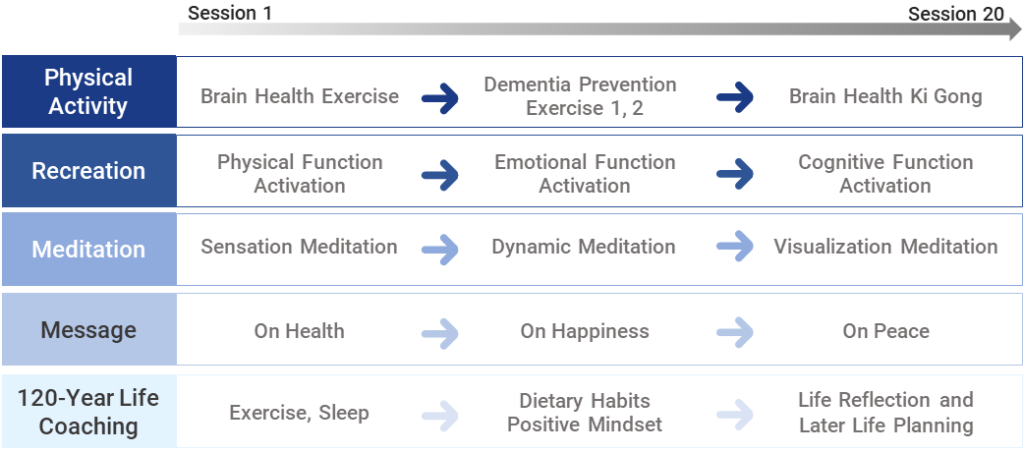
Cases of Application
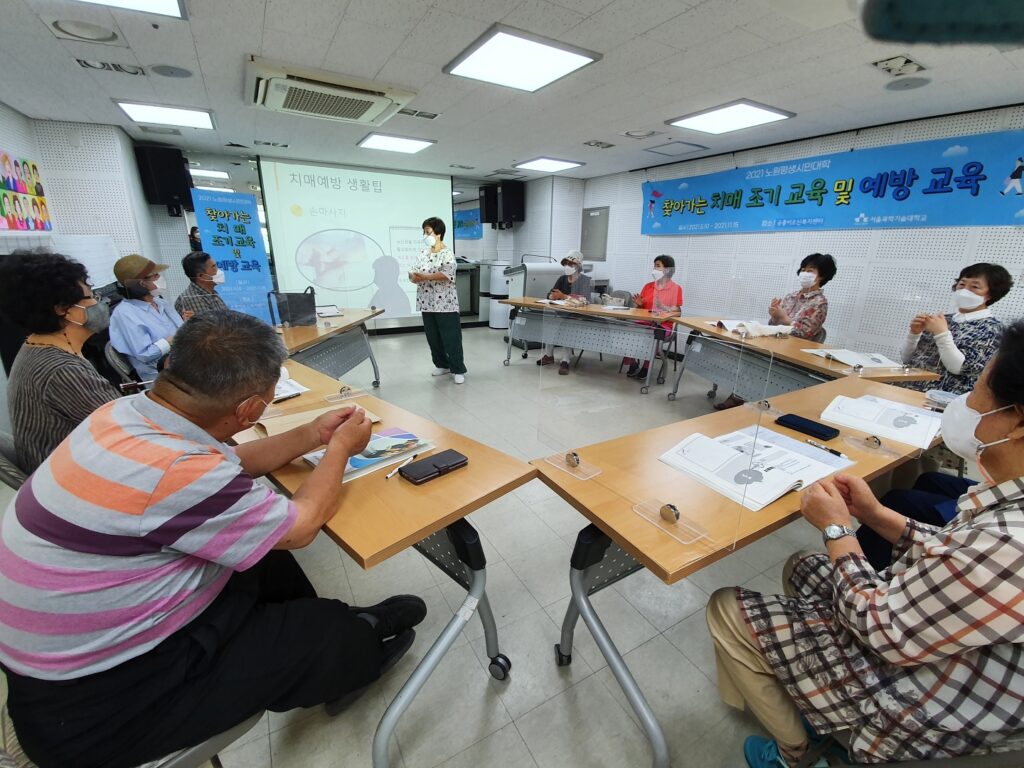
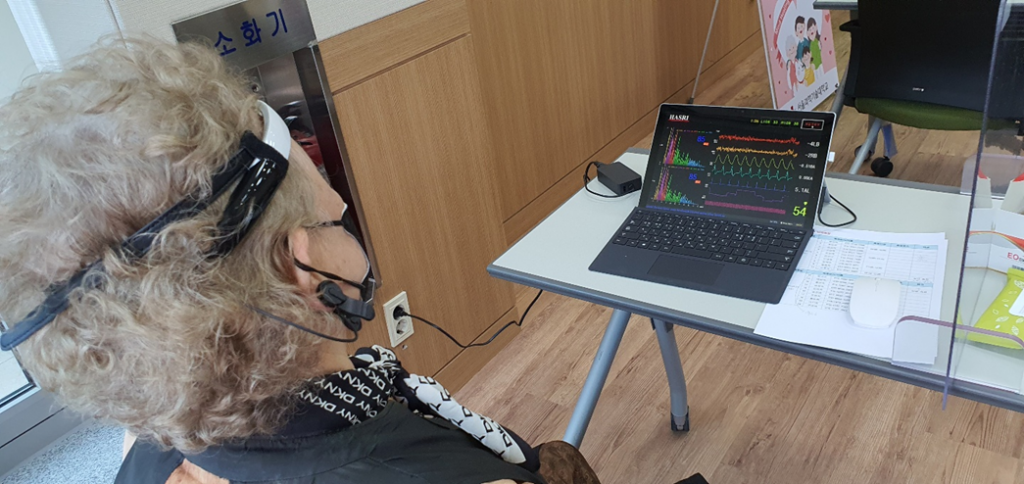
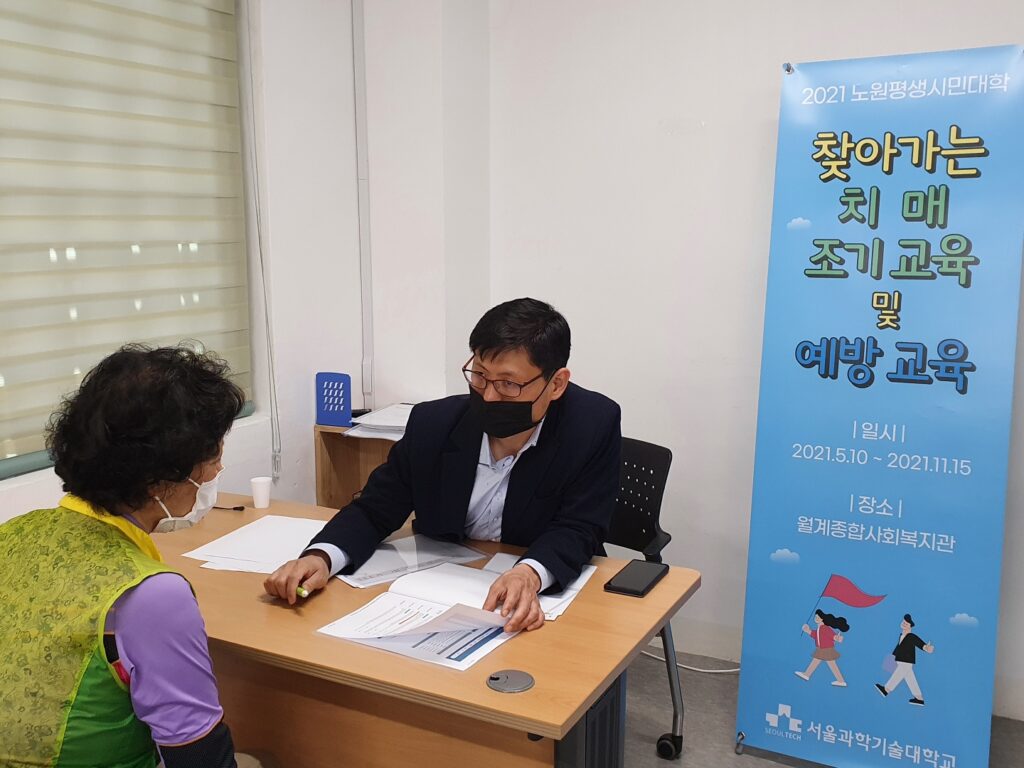
1. Brain health training program for the elderly by Seoul municipal government (2020)
The Seoul municipal government conducted the “brain health project for the elderly” in 2020 and The Brain Trainer Association participated in the project as a partner institution and conducted brain wave measuring and brain training programs. The number of project participants was scaled down to 484 amidst the pandemic and 52 participants among them received brain wave measuring, braining training, and life coaching tailored to their brain wave measurements.
22 people or 42% of the participants were in the healthy condition from the preliminary brain wave measuring and were advised to pay heed to the prevention of dementia. In addition, tips were provided, too, to help them lead more satisfactory changes to their daily lives, by adding physical activity, meditation, and others. Meanwhile, 14 elderly people who were suspected of being in a pre-dementia phase were recommended exercises to activate brain functions and receive in-depth dementia diagnosis at a hospital. This program received favorable reviews from the elderly participants in that they had an opportunity to detect brain dysfunction early and make proactive responses.
2. Early Assesment of Dementia and Education for Prevention: Nowon Lifelong Citizens University (2021
In 2021, the Brain Trainer Association conducted the Early Assessment of Dementia and Education for Prevention program in partnership with Seoul National University of Science and Technology, which operates Nowon Lifelong Citizens University with support from the Nowon-gu office in Seoul.
This training program, composed of two sessions, was conducted for 140 people, and each session included life coaching (2 sessions) and brain training for dementia prevention (8 sessions) tailored to the trainees’ EEG-based brain aging measurement.
31 people were found at risk for dementia and 7 people at risk for arrhythmia, and in-depth diagnosis by medical institutions was recommended to them. After the eight sessions of brain training, 20 participants showed improvement in brain function aging indices and positive progress in physical and mental health.
In particular, lifestyle coaching suggested the participants positive changes in their daily lives, such as brain exercise, meditation, diets, and sleeping habits, tailored to each participant’s brain wave measurements.
Result and Outlook
The Brain Trainer Association offers brain health measurement through an EEG biomarker-based device. This technology ensures accurate assessments with reduced time and financial costs. Coupled with life coaching and brain training programs, individuals can prevent brain dysfunction and receive tailored advice for maintaining brain health.
Expanding this training program hinges on producing a professional workforce through a national licensing system for trainers. Continuous investments in brain science and education are also paramount.
As Korea swiftly transitions into an ultra-aging population phase, dementia assessment and brain training programs that cater to the elderly are vital. Such initiatives can significantly elevate the quality and satisfaction of life, ensuring healthy aging. By promoting brain health and social engagement, we can reduce the fiscal pressures associated with welfare and medical services tied to an aging populace. This approach could offer a foundational solution to address global aging issues, especially in developed nations.

